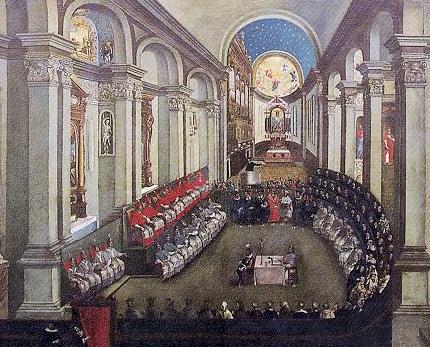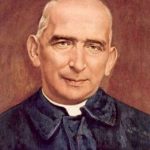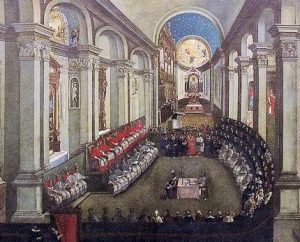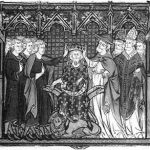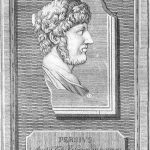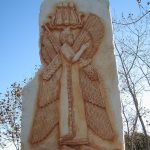History, Holidays & Observances on December 4
A look at some of the history and holidays on December 4
 Holidays & Observances on December 4
Holidays & Observances on December 4
Feast of Giovanni Calabria, a 20th century Catholic Priest who dedicated his life to easing the plight of the poor and ill. He establshed several religious institutions, corresponded in Latin with C.S. Lewis, and during WWII, helped to hide a female Jewish Doctor from the Nazi’s in a nunnery which he oversaw.
 Major Events on December 4
Major Events on December 4
1563 – Reformation & Counter Reformation: The Council of Trent
The Church, aware of its problems of corruption, had addressed some of the issues in the 1517 Fifth Council of the Lateran, but it was too little, too late. On 31 October 1517, the Catholic Priest, Martin Luther, famously nailed his 95 Theses to the door of All Saints’ Church in Wittenberg, setting in motion the chain of events that led to the Protestant Reformation. Many of Luther’s criticisms of corruption within the Church were valid, with one of the most visible being the sale of indulgences by Pope Leo X to fund the renovation of St. Peter’s Basilica. Indulgences were a grant of dispensation from divine punishments, often for certain good acts, but increasingly during the Middle Ages, indulgences were sold to bring wealth to the Church. As one cynic of the era put it, “As soon as the coin in the coffer rings, the soul from purgatory springs.”
The Protestant movement quickly gained momentum and the support of various nobles throughout Europe. Pope Paul III convened the Council of Trent in 1545, ostensibly to heal the breach between the growing body of Protestant reformers and the Catholic Church. The Council would meet 25 times, with the last meeting occurring on this date in 1563. When it was clear that the breach between Catholics and Protestants would not be healed, the Council became “the embodiment of the Counter Reformation.” The council ended with a condemnation of Protestant heresies and a clarification of Catholic dogma. Further, the Council addressed many of the issues of corruption raised by Luther and instituted other reforms. Ultimately, the Council rejected Matin Luther’s central thesis, that faith alone decided one’s fate, while the Catholic Church clarified its position that both faith and good works were necessary for salvation. Both the Reformation and the Counter Reformation would significantly impact the course of European history in the 16th through the 18th century, and we are still very much living with its reverberations today.
1745 – Jacobite Rebellion
The Jacobite forces staging a rebellion against George II advance on Derby this day, that being the farthest point of their advance before turning back, then being decisively defeated by British Royal forces at the Battle of Culloden. Many of the Jacobites captured in that battle were deported to the American colonies.
The Jacobite movement arose after England’s successful coup against the Catholic King James II and the Stuart line of Kings in the 1688 Glorious Revolution. The coup did not sit well with many of the Scottish highlanders or the Irish Lords, all supported by the French monarchy. The Scots and Irish started the Jacobite movementto reinstall the line of James II back to the throne. Five notable events surround the Jacobite movement. The first was the Glencoe Massacre (the basis for the Red Wedding in the Game of Thrones) by the Campbells of the MacDonalds. Next were the two armed rebellions launched by the Jacobites in 1715 and 1745 to reinstall the Stuart line. Fourth was how James Wilkes used the imagery of the Jacobite rebellions to end the political career of a British Prime Minister, the Scottish Earl of Bute, in 1763. The fifth and last was France’s planned invasion of Britain circa 1758, during the Seven Years War / French and Indian War, to reinstall the Catholic Stuarts to the throne. The plan was scrapped following Britain’s naval victories in the war.
1829 – Multiculturalism done right
When British Lord William Bentick was appointed the first governor general of British-occupied India, he instituted many significant educational and social reforms, but none so locally controversial as instituting the penalty of death for anyone who abetted the “suttee.” Suttee was an ancient custom practiced among certain Hindu sects that, upon the death of her husband, the wife, voluntarily or involuntarily, was placed on the funeraly pyre and burned to death with her husband’s corpse. Bentick, with the support of an Indian reformer, outlawed the practice on this date.
That was not the end of the practice however. It was still being practiced when Charles James Napier was appointed governor general. On one occasion, informed that a suttee ceremony was planned, Napier intervened to stop it. The Hindu priests complained to him that this was an ancient religious custom and, as such, it should be respected by the British. Napier replied:
- “Be it so. This burning of widows is your custom; prepare the funeral pile. But my nation has also a custom. When men burn women alive we hang them, and confiscate all their property. My carpenters shall therefore erect gibbets on which to hang all concerned when the widow is consumed. Let us all act according to national customs.”
 Notable Events on December 4
Notable Events on December 4
771 – King Carloman I, a co-regent with his brother Charlemagne, was near the point of open warfare with his brother when he suddenly and conveniently died of a “nose bleed.” Charlemagne was left the sole King of the Franks.
1872 – The “ghost ship” Mary Celeste was found on this date by the Canadian brig Dei Gratia. The ship had been abandoned for nine days, but was only slightly damaged and all of the crews possessions were aboard and undisturbed. The crew was never found and the mystery of the Mary Celeste has never been solved..
1945 – By a vote of 65–7, the United States Senate approves United States participation in the United Nations. Internationalists rejoice.
 Born on December 4
Born on December 4
AD 34 – Persius, a Roman poet and satarist whose work became very popular during the Middle Ages. Some of his quotes are “Live with yourself: get to know how poorly furnished you are,” and “Don’t consult anyone’s opinions but your own.”
 Died on December 4
Died on December 4
530 BC – Cyrus the Great, a warrior king, he founded the Achaemenid Empire, the first Persian Empire. At the time of his death, it was the largest empire in history.
749 – John of Damascus, an 8th century polymath who made contributions in law, theology, philosophy, and music. He wrote works explaining Christian dogma, and composed hymns which are still used in Eastern Christian practice throughout the world as well as in western Lutheranism at Easter. He is one of the Fathers of the Eastern Orthodox Church and is best known for his strong defence of icons. The Catholic Church regards him as a Doctor of the Church, often referred to as the Doctor of the Assumption due to his writings on the Assumption of Mary
1679 – Thomas Hobbes, a nihilistic English political philosopher who wrote The Leviathan. Hobbes coined the phrase that the life of man in a state of nature is “nasty, brutish and short.” He supported an all powerful monarchy and was the first to propose a government as being in a social contract with the populace
Christmas Music
Sleigh Ride is a popular, light orchestral piece composed in 1946.
I Saw Three Ships is a traditional English carol dating from the 17th century:
And lastly, a Christmas album by various artists, including Andrea Bocelli, Luciano Pavarotti, and Sarah Brightman:
https://youtu.be/xIbQEZJq2DY
